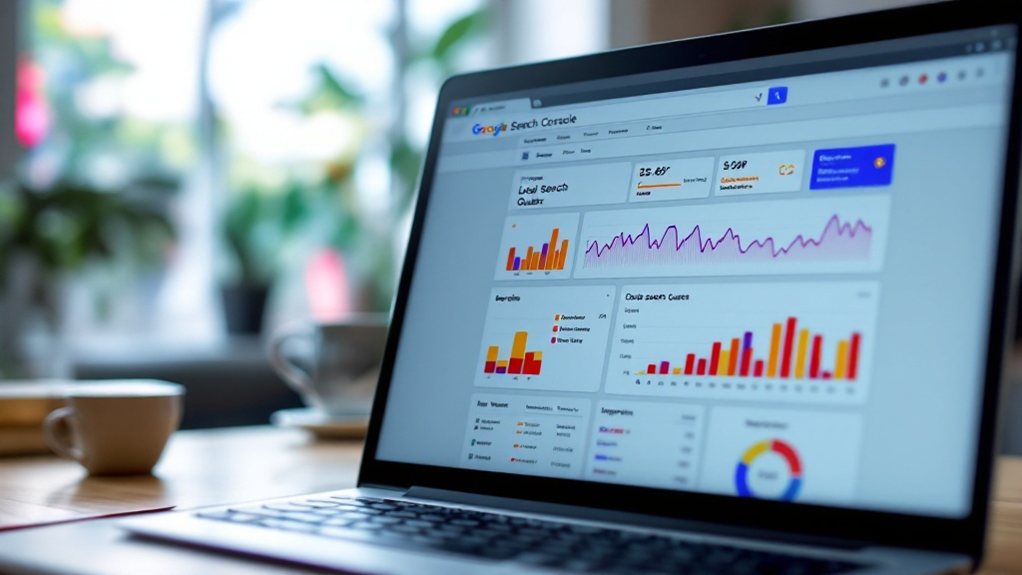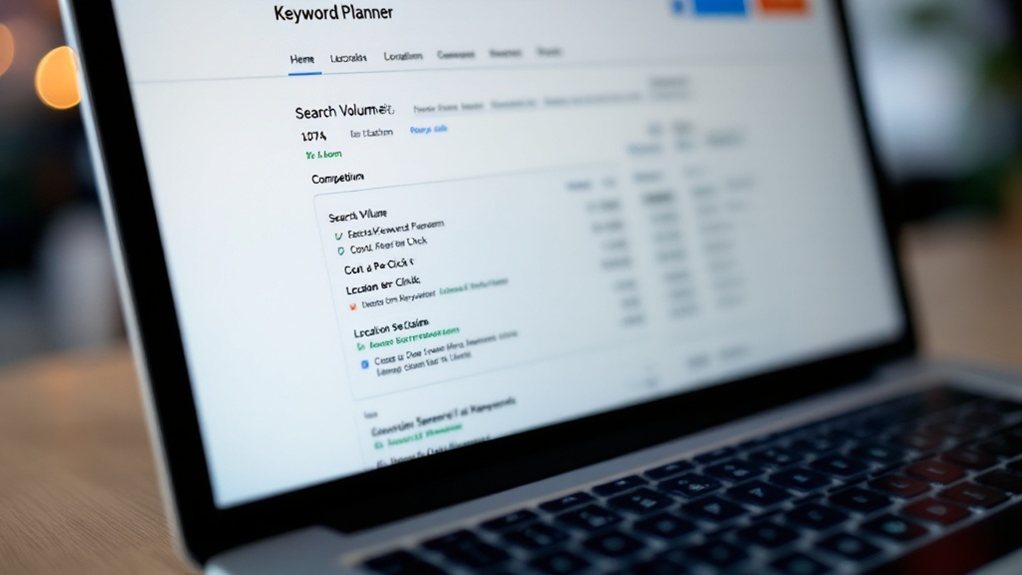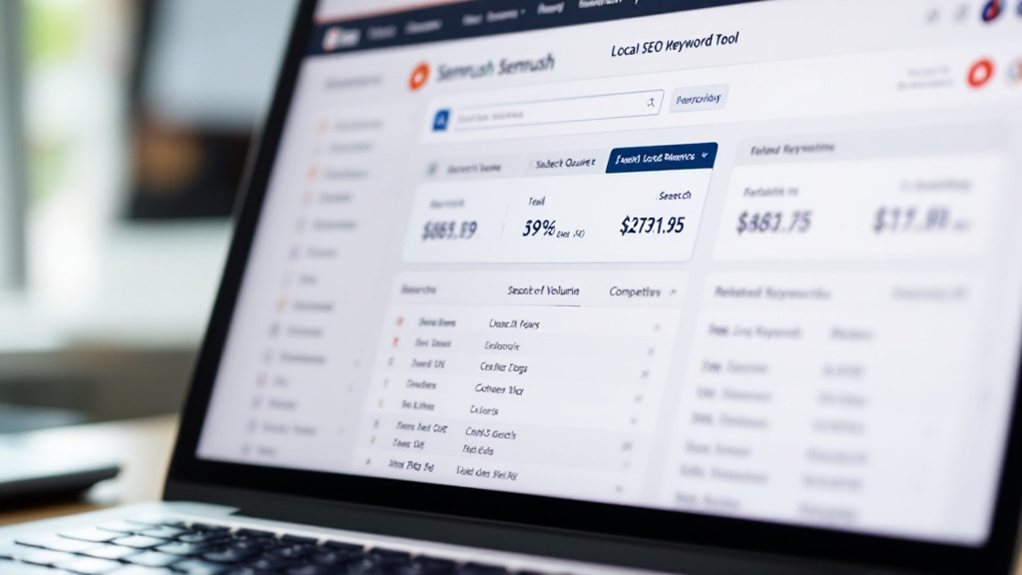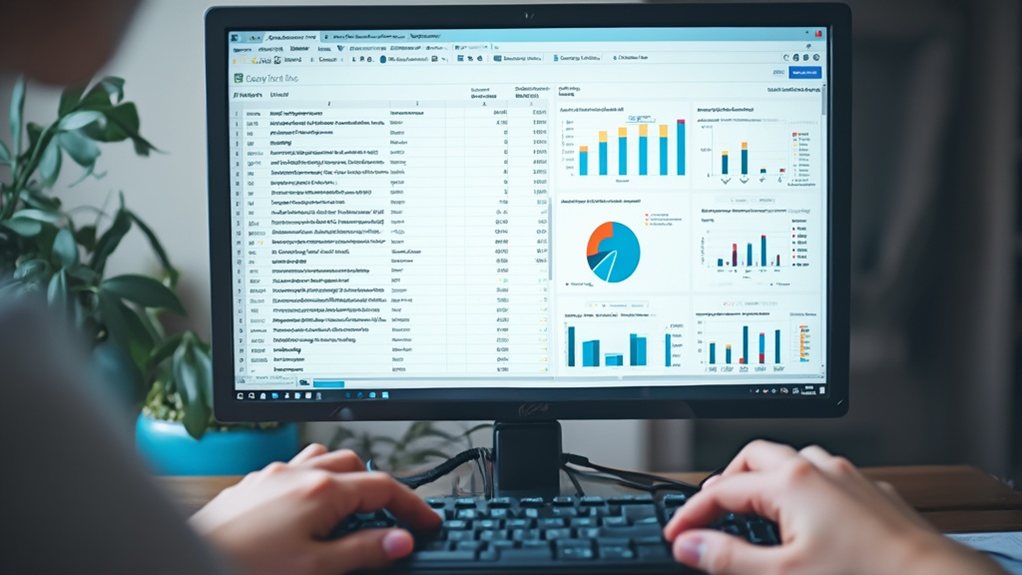Analyze local search query data by leveraging Google Search Console, Google Keyword Planner, Semrush's local SEO tools, and Google Analytics 4. Uncover insights on your target audience's search behavior and preferences within a specific geographic area. Optimize your content, listings, and overall strategy to outshine local competitors. This will help you refine your approach and stay ahead of evolving local search trends. To dive deeper into maximizing your local SEO, continue exploring the outlined strategies.
Leveraging Google Search Console for Local Performance Insights

Though getting your website verified with Google Search Console may seem like a hassle, doing so unlocks a wealth of valuable local performance insights. Once verified, allow a few weeks for data collection, then analyze impressions, clicks, and positioning over a 6-12 month date range. Use the Query filter to dive into specific keywords, and integrate with Google Analytics for a comprehensive view. Focus on high-impression queries, track click-through rates, and target "striking distance" keywords to improve targeting. Regularly monitor GSC data to capitalize on local keyword opportunities. Regularly monitor data to adapt your local SEO strategy, and leverage advanced features like Search Console Insights to uncover hidden opportunities and optimize content effectively.
Utilizing Google Keyword Planner for Region-Specific Query Volumes

Once you've gained valuable insights from Google Search Console, you can leverage the Google Keyword Planner to uncover region-specific search query volumes. The free tool offers limited access to search data, allowing you to target specific locations and view average monthly search volumes. The search volume numbers are historical, representing a 12-month average. While the figures may be rounded and inflated, the Keyword Planner can still provide a solid starting point for your local SEO efforts. Combine this data with competitor analysis and Google Trends to refine your keyword lists and create targeted landing pages. By optimizing your on-page content and leveraging location-specific keywords, you can improve your visibility in local search results.
Unlocking Local Insights With Semrush's Local SEO Tools

While Google Keyword Planner offers a solid starting point for understanding regional search volumes, Semrush's local SEO tools provide a more comprehensive approach to unlocking valuable insights for your local business. Leverage the Keyword Magic Tool to find relevant local queries, filter by location modifiers, and analyze search volumes and competition. Utilize Semrush Local to distribute your business data across directories, optimize listings for voice search, and monitor your local visibility and review management. By harnessing these powerful local SEO tools, you can gain a deeper understanding of your market, enhance your online presence, and drive more customers to your doorstep. [Semrush Local also allows you to track your local rankings in a heatmap and get recommendations on how to improve them.
Integrating Google Analytics 4 to Understand Local User Engagement
Leveraging Google Analytics 4 (GA4) can provide valuable insights into your local user engagement. Bounce rate no longer exists in GA4, but new metrics like engaged sessions can help you understand how users in your target markets interact with your online presence. Analyze user location data, engagement metrics like conversions and session duration, and refine your content to better connect with local audiences. Combine GA4 insights with other local SEO tools for a comprehensive understanding of how users in your target markets interact with your online presence.
Track User Location Data
Integrating Google Analytics 4 (GA4) allows you to thoroughly track user location data and understand local user engagement. With GA4's geo-targeting capabilities, you can analyze visitor counts by country, region, and city. This data empowers you to create targeted marketing campaigns and adjust content to meet regional preferences. GA4 provides advanced tools for analyzing user behavior on websites and apps.
| Location Data Collection | Privacy Considerations |
|---|---|
| IP geolocation identifies user locations | GA4 offers IP address masking |
| VPN usage can affect data accuracy | Privacy laws like GDPR must be adhered to |
| Granular data includes city-level information | Country-specific data collection controls |
Leveraging location insights enhances user experience, boosts engagement, and informs strategic decisions to drive business growth.
Analyze Engagement Metrics
Integrating Google Analytics 4 (GA4) can provide you with a wealth of insights into how local users engage with your content. Leverage key engagement metrics like Average Engagement Time and Engaged Sessions to assess content effectiveness. GA4's Active Users and Sessions Per User metrics help you understand your audience's engagement levels and identify your most valuable local visitors. Align user engagement metrics with the purpose of the website and marketing goals to ensure your analysis is tailored to your local strategy. Customize your reports and explorations to focus on the engagement data most relevant to your local strategy. Use these insights to optimize your content, refine your approaches, and target your highly engaged local audience segments. GA4's flexibility enables you to tailor your engagement analysis to your unique local needs.
Optimize Content for Locales
Optimizing local content is key to capturing the attention of your target audience. By integrating Google Analytics 4 (GA4) into your local content strategy, you can gain invaluable insights into how users engage with your neighborhood-specific offerings.
Some key benefits of leveraging GA4 for local content optimization include:
- Granular user behavior analysis to understand what resonates with your local audience.
- Detailed demographic data to tailor content to your community's unique preferences.
- Refined session tracking to accurately measure local engagement and conversions.
- Actionable data-driven insights to continuously refine and improve your local content strategy.
Leveraging GA4 provides a dual approach to analyze local search query data and empower you to create hyper-targeted, user-centric local content that outperforms the competition.
Optimizing With Kwfinder's Local Search Volume Analysis
KWFinder's local search volume analysis is a powerful tool in your local SEO arsenal. Use location-specific search volumes to optimize content for better visibility. Enhance your Google Business Profile with highly relevant keywords to improve local pack rankings. Track keyword rankings and monitor competitor performance to assess the effectiveness of your local SEO strategy. Identify emerging trends by analyzing changes in search volume over time. Leverage KWFinder's extensive location database and integrate it with SERPChecker to gain a comprehensive understanding of your local search landscape. Optimize your content, citations, and other local assets using this powerful data-driven approach to drive more qualified traffic to your business.
Factors Driving Local Search Algorithm Ranking
Several key factors drive the local search algorithm ranking. Relevance, proximity, prominence, and consistent NAP information are crucial. Additionally, behavioral signals like click-through rates and site engagement impact local SEO. Proximity, the distance between a business and a local searcher, is a crucial ranking factor. Here are four key considerations:
- Relevance – How well does your business match the search intent?
- Proximity – How close is your business to the searcher's location?
- Prominence – What is your business's reputation and recognition in the local area?
- NAP Consistency – Is your Name, Address, and Phone Number information accurate and consistent across online directories?
Optimizing these factors can significantly improve your visibility through local search algorithm ranking.
Conducting Comprehensive Local Keyword Research
When conducting local keyword research, you'll want to identify location-based search terms that incorporate specific neighborhoods, landmarks, or ZIP codes. Search engine algorithms consider keyword prevalence as a major ranking factor. Additionally, analyzing your competitors' keyword strategies can help you uncover untapped opportunities in the local market. By combining these approaches, you can develop a comprehensive local SEO strategy that targets the most relevant and high-potential keywords for your business.
Identify Location-Based Keywords
Conducting comprehensive local keyword research is essential for identifying the right location-based keywords to optimize your business's online presence. Location terms, such as city or neighborhood names, are crucial for local SEO, allowing you to target specific geographic areas. Additionally, consider incorporating core terms that represent your main services or products, as well as modifiers like "best" or "affordable" to attract specific audiences.
To enhance your local keyword research, leverage tools like:
- Ubersuggest for discovering new keywords and analyzing competitors' strategies.
- Google Keyword Planner for determining keyword popularity and planning ad campaigns.
- Semrush Keyword Magic Tool for a comprehensive set of location-based keywords.
- Google Trends for insights into trending local keywords and topics.
Analyze Competitor Strategies
To truly understand your local search landscape, you must thoroughly analyze your competitors' keyword strategies. Assess which competitors consistently rank high in SERPs to grasp their effective tactics. Examine the content types they use, identifying keyword gaps you can fill. Check how they optimize titles and meta descriptions, and leverage their high-quality backlinks. Use keyword research tools to find relevant terms, then analyze search volumes and competitor content. Review how they optimize their Google Business Profiles, including customer reviews, keyword usage, and media quality. Finally, identify their weaknesses, analyze their review management, and compare backlink profiles to uncover opportunities for improvement.
Prioritizing High-Impact Local Keywords
Prioritizing high-impact local keywords is crucial for any business seeking to optimize its online presence and attract local customers. By identifying relevant metrics, categorizing keywords by intent, segmenting by location, and conducting thorough keyword research, you can uncover the most valuable terms to integrate into your content strategy.
- Analyze search volume, local intent, keyword difficulty, CPC, and trends to gauge the potential impact of each keyword.
- Classify keywords based on navigational, informational, transactional, and commercial investigation intent to ensure they align with local user behavior.
- Refine your keyword set by incorporating city names, ZIP codes, landmarks, and community-specific terms to target your service area.
- Leverage tools like Google Keyword Planner, Semrush, and Ahrefs to research and prioritize the most lucrative local keywords.
Strategically Incorporating Local Search Data Into SEO
Optimizing your website content with location-specific guides, local stories, and content clusters can improve your visibility in local search results. Fully leveraging your Google Business Profile by integrating keywords, adding high-quality photos, and managing reviews can also boost your local SEO efforts. Developing a strong local citation and backlink profile through directory listings, partnerships, and community engagement can further solidify your local search presence.
Optimize Website Content
Strategically incorporating local search data into your SEO efforts can significantly optimize your website content. By leveraging this data, you can:
- Craft targeted, locally-relevant content that resonates with your audience and improves engagement.
- Integrate local keywords seamlessly to enhance visibility for local queries.
- Diversify your content formats, including blog posts, news, and community updates, to cater to diverse needs.
- Focus on location-specific content to establish your local authority and credibility.
Ultimately, aligning your website content with local search insights empowers you to deliver a more personalized and impactful user experience, ultimately boosting your search rankings.
Leverage Google Business Profile
Leveraging Google Business Profile is a powerful way to capitalize on local search data and strengthen your SEO efforts. Ensure your business information is accurate and up-to-date, then engage with customers through reviews and content. Utilize strategic keywords, add high-quality photos, and maintain consistency across online platforms.
| Optimize GBP for Visibility | Manage Customer Reviews | Utilize GBP Insights |
|---|---|---|
| Complete all profile sections | Encourage positive reviews | Track views and searches |
| Incorporate relevant keywords | Respond to all reviews | Analyze customer actions |
| Maintain business prominence | Handle negative reviews tactfully | Assess local search performance |
| Update information regularly | Leverage reviews as social proof | Integrate insights with analytics |
Leveraging Google Business Profile enables you to effectively leverage local search data and improve your overall SEO strategy.
Monitoring and Adapting to Evolving Local Search Trends
Monitoring local search query data is crucial as user preferences and behavior continue to evolve. Adapt your strategies by:
- Leveraging hyperlocal advertising on social platforms to target specific geographic areas effectively.
- Incorporating digital out-of-home (DOOH) advertising in strategic locations to enhance visibility during peak times.
- Proactively managing customer reviews, addressing negative feedback promptly to maintain credibility.
- Staying updated on the relevance of local directories like Yelp and Tripadvisor, as Google cracks down on fake reviews.
Embracing these evolving trends will ensure your local SEO efforts remain impactful and aligned with the changing landscape.
